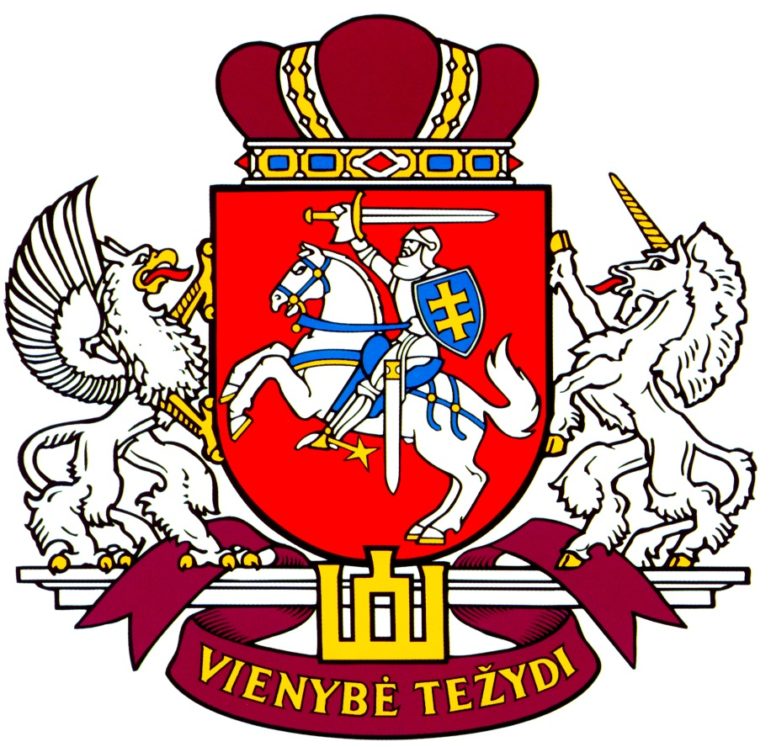STRASBOURG – The European Court of Human Rights (ECHR) has ruled that Lithuania has violated the human rights of Romuva by not recognizing the religion. Romuva is the reconstructed and revived Indigenous faith of Lithuania. Romuva officially registered in Lithuania in 1992.

Coat of arms of the Seimas of Lithuania
On June 27, 2019, 31 lawmakers of the Seimas, the Lithuanian Parliament, voted against recognizing Romuva. While 40 lawmakers voted in favor of recognition, 31 lawmakers voted against recognizing Romuva of which 15 abstained causing the vote to fall short of the needed majority.
Initially, reports from Vilnius suggested Romuva would be welcomed as a recognized religion with 46 members of the Seimas voting in favor. However, just a few hours before the final and likely positive vote, Catholic Archbishop Gintaras Grušas, voiced opposition to Romuva’s recognition, spurring a conservative backlash.
Recognition of Romuva by the Lithuanian state would confer upon the group various legal rights including being able to receive tax credits for real property, function as a charity, provide social insurance coverage for its clergy, and gain legal recognition of marriages performed by its clergy. They would also gain the right to airtime from national broadcasters to present religious services.
At the time, Inija Trinkūnienė, High Priestess in the Romuva community said, “We regret this happened because we meet all the requirements under law to be recognized by the state as a religious community, and we believe that the Seimas violates [our] human rights in this way.”
Trinkūnienė added that the Romuva community would review their options and likely appeal to the ECHR.

Romuva Flag – Image credit: DiegoAma – WikiCommons
Yesterday’s ruling by the ECHR culminates the appeal process.
In a unanimous decision, the seven-judge pane of the ECHR “concluded that the State authorities have not provided a reasonable and objective explanation as to why the applicant community was treated differently from other religious communities in a similar situation.”
In a 35-page opinion, the ECHR noted that “[T]he Seimas refused to grant status asserting that “the members of the Seimas had not relied on the conclusions of the relevant authorities, but had based their decision on their own religious convictions and political interests: they had invoked the applicant association’s alleged threat to Christianity, quoted the arguments presented by the Lithuanian Bishops’ Conference in its letter to the members of the Seimas, and made baseless allegations about the applicant association having links to the Kremlin.”
The Court also rejected arguments regarding “the majority of Lithuanians being Catholic, the historical importance of Christianity in Lithuania, and the impact which the granting of State recognition to a pagan religious association could have on Lithuania’s relations with “the Christian world’… [and] good relationship with the Catholic Church.”
The Court added, “[T]he impugned decision might also have been influenced by the wish of some members of the Seimas to exact political revenge against one of the leaders of the governing coalition at the time, who was seen as favourable to the applicant association’s faith.”
The ECHR underscored that “likewise emphasised that the existence of a majority or a historically predominant religion cannot justify discrimination against minority religious groups…. the Court is unable to accept that the existence of a religion to which the majority of the population adheres, or any alleged tension between the applicant association and the majority religion, or the opposition of an authority of that religion, could constitute objective and reasonable justification for refusing State recognition to the applicant association.”

The ECHR wrote that, “State authorities did not provide a reasonable and objective justification for treating the applicant association differently from other religious
associations.” The Court concluded that “the members of the Seimas who voted against the granting of State recognition did not remain neutral and impartial in exercising their regulatory powers.”
The Court repeatedly emphasized that “true religious pluralism is vital to the survival of a democratic society.”
The Romuva community did not seek damages before the ECHR. Trinkūnienė said the lawsuit was never to gain material compensation but rather to encourage politicians to change legislation and treat religions equally under the law.
Andras Corban-Arthen, President of the European Congress of Ethnic Religions (ECER) and Vice-Chair of the Parliament of World Religions, told The Wild Hunt that Romuva is a founding member of the ECER.
Corban-Arthen said, “Today’s decision by the European Court of Human Rights (ECHR) in support of Romuva’s demand was highly anticipated, and it was very rewarding to see the thorough analysis of the brief, the respect and consideration which Romuva was accorded and, most importantly, the Court’s unanimous response. ”
Corban-Arthen found the highly-anticipated statement from the ECHR was both well-received and unexpected. He also welcomed the Court’s thorough analysis of the situation, the respect it showed to the Romuva community, and how the Court forcefully addressed the obvious intervention of the Catholic bishops conference on the Seimas vote and noted that the mere presence of a religious majority cannot infringe on the rights of minority faiths.
Singer Vėtra Trinkūnaitė reacted:
A big mark of shame and a huge human rights and religious discrimination from Lithuanian government – with a strong pressure from Catholic church, the parliament voted to not recognize Romuva as a “recognized non-traditional religion” (even though Romuva met all the requirements to be recognized). Isn’t it ironic that a religion that is based on ancient Lithuanian traditions is not recognized in it’s own country? Romuva is growing bigger very rapidly, and that’s a threat to certain individuals and organizations.
I’m proud to be a daughter of the founders of Romuva and I wish that Romuva people (and people who support Romuva’s work) would be more active about expressing their beliefs and support.

via Vėtra Trinkūnaitė [Facebook]
After consulting with their Lithuanian board members, the ECER released a statement this morning that said, in part, “The decision by the Seimas, under strong pressure from the Roman Catholic church, represents not only a gross violation of the Lithuanian Constitution, but also contravenes important treaties and agreements such as the Charter of Fundamental Rights of the European Union and the United Nations’ Universal Declaration of Human Rights.”
What happens next is unclear and the Saiemas has yet to respond.
Nevertheless, the victory at the ECHR will resonate. “This was the most important step yet in Romuva’s longstanding efforts to gain official government recognition as a religion,” Corban-Arthen said.
Romuva is still small with under ten thousand adherents in Lithuania but it is a growing faith. The previous census in 2011 had seen it grow five-fold and a new census is scheduled for this year. Some reports suggest new data will see ten times as many adherents.
Corban-Arthen noted, “This could create a precedent for other European pagan groups which may want to challenge in Court similar oppositional efforts from mainstream churches in their countries.”
The Wild Hunt is not responsible for links to external content.
To join a conversation on this post:
Visit our The Wild Hunt subreddit! Point your favorite browser to https://www.reddit.com/r/The_Wild_Hunt_News/, then click “JOIN”. Make sure to click the bell, too, to be notified of new articles posted to our subreddit.